#exotic medicine
Text

Another adorable patient this week. ❤️
Our friend hasn’t been eating, so he’s a little on the thin side, but with some husbandry corrections, hopefully he’ll be back to eating again and gaining weight.
32 notes
·
View notes
Text
Why Exotic Vet? How To Choose Best Exotic Veterinarian?

Finding a veterinarian to care for a unique pet might be difficult for individuals who desire to maintain an unusual animal as a pet. In addition, not all veterinarians are educated or prepared to diagnose and treat animals such as rabbits, ferrets, geckos, and parrots. Thanks to popular search engines such as Google, finding an exotic vet near me is all you need to surf to get the ideal vet for your exotic pet in Houston TX.
Depending on what sort of breed or pet you have, finding a vet to work with may be a significant struggle. However, using these recommendations, you may choose a competent exotic pet doctor to care for your buddy.
Simply put, all of our family members require good medical care. But, of course, that applies to two-legged, hairy, scaly, or winged family members.
Excellent veterinarian care for our exotic pets is just as crucial as for your dog or child. If you have an unusual pet, whether a giant snake, a beautiful tropical bird, or a tiny pocket pet, you should choose a veterinarian specialising in exotic pet care.
How To Choose the Best Exotic Vet?
Finding a vet to care for your exotic pet might be difficult, but it is not impossible. You can try a variety of resources.
Other exotic pet owners - Word-of-mouth is one of the most excellent methods to discover a vet who will handle unusual animals. Your fellow unknown pet owners are likely to know and use someone and may be able to recommend someone.
Your average local veterinarian - Another fantastic place to seek a vet for your exotic pet is your regular neighbourhood physician. Many private practices employ exotic pet veterinarians.
Whether you already have a relationship with a pattern, contact them to check if the physicians there will see your exotic pet. Regarding exotic animals, the experts at certain larger veterinary institutions may have a broader range of experience. Even if they don't see them, they may recommend you to another practitioner that would.
Larger hospitals - Check with a veterinary school or a central institution-style practice. Exotic species are frequently given their department at these establishments. They’ll also offer exotic medicine for your exotic pet.
Veterinary associations - Several national and worldwide associations exist for veterinarians who have a particular interest in a specific animal class. These organisations do not require anything more than a membership fee for the veterinarian to join. Still, search for a veterinarian listed through one of these organisations. You will likely find someone who has invested the time and money to learn additional skills and medicine to treat that species.
Looking for an Emergency Veterinary Exotics?
If your exotic pet is in crisis or you are concerned that they are dying and require quick assistance, don't put off looking for an exotic veterinarian.
Most small animal practitioners and after-hours emergency facilities have the equipment to stabilise exotic animals using oxygen treatment and heat. Although they may not have the resources to diagnose or treat your pet, they can save you time and assist you in finding a professional vet to whom they can refer the situation.
An exotic veterinarian cannot treat all sorts of exotic pets. Previously, expertise in veterinary medicine was not required. As regular pet practitioners, "exotic vets" fulfilled their tasks. They would apply their knowledge of one species to another and broaden the therapy. However, a cat is not the same as a little dog. We now know better after multiple tragedies caused by ineffective treatment.
A professional bird vet cannot treat small mammals; the same should be assumed if you bring a marsupial to a reptile expert. Therefore, it is prudent to seek an exotic veterinarian who is a good fit for your pet's species. If their qualifications don't match, they should deny therapy; otherwise, you're just setting yourself up for failure.
0 notes
Text
I’m at the american association for zoo veterinarians conference this week and they’re having an official shooting competition (with prizes) to determine who is the best with a dart gun… this is the best academic conference I’ve ever attended
4K notes
·
View notes
Text
bed sharing is too stimulating, going on and on about his youthful high temperature and his scent, his unique scent, his male hormones
#'pressing his lips to the side of xie qingcheng's neck and letting the tips of his teeth brush up against the older man's skin-#meatbun are you trying to kill me?#meatbun what does he yu smell like?#what is his unique scent#see; chu wanning smells like haitang; xqc smells like medicine#and i always picture mo ran having an incredibly musky and animalistic scent; enhanced by an exotic mix of cinnamon and oud#(extremely specific thank you 🥰 i even have meanings behind it)#because cinnamon is spicy and sweet and is so often used in cooking and baking and even has medicinal purposes#and oud as the infected heartwood of a specific tree; described as black and strong and animalistic#anyways#what does he yu smell like? am i going to end up brainstorming up an incredibly specific scent for him#mo ran is never specified to have such a scent anyways but it's my interpretation and i can do whatever i want!!!!#throws a dart it's because of his demon heritage!!! he gets special abo traits as a treat for the man who mentally is already living in abo#oud is also frequently used for incense; so i think cinnamon and oud suit mo ran's dual nature extremely well#i keep getting distracted#for fun..... he yu smells like smashed blueberries; a bit sweet a bit sour a little musky#and blood 😊#the sweetness of blueberries covering up thick salty copper musk of blood#perfumes are one of my special interests; so i like to get carried away 💝#i feel like my scent profile for he yu might change as i read though
12 notes
·
View notes
Text
snake x-rays anyone?


Say hello to Noodle, my almost 19-year-old lavender zigzag corn snake. Last fed 3 weeks ago, and in the last four days or so started getting a firm lump 4" or so cranial to his cloaca. Getting bloated cranial to the lump, yadda yadda, only able to pass a couple dime-sized urates, and only after effort. He's easily exhausted and generally just not feeling good. Been getting warm water soaks nightly to no avail. He has an appointment with his vet on Wednesday. I did these rads today at the clinic I work at, but we work with cats so we have no idea wtf we're seeing or even really how to x-ray a snake :D. Yes he's backed up but the question is whyyyyy and I won't get an answer until Wednesday. Bleh.
#snakeblr#snake#corn snake#x-ray#radiograph#vet#vet tech#veterinary nurse#veterinary medicine#exotic pets#reptiles
13 notes
·
View notes
Text
woc, please find yourself doctors, therapists and any other healthcare practitioners that come from a similar ethnic background to you - it's only been two sessions and i've had more breakthroughs about my intense PTSD in two weeks than I have in seven years.
#being able to vent about racism without it having to be explained as to why something was racist#indescribable relief#she just GOT it#i said my r-p1st called me exotic - and she knew exactly where i was coming from#i think i sobbed#and even if you can't get the same ethnic background as you - my therapist is desi#and i am egyptian-mexican but she completely understood#please don't underestimate medical racism#woc#woc experience#latina#latine#north african#poc#imazighen#mental health#therapy#racism in therapy#racism in medicine
2 notes
·
View notes
Text

🔥Calcifer🔥

#leopard#lizard#exotics#veterinary medicine#cute animals#animals#nature#gecko#leopard gecko#howls moving castle#calcifer#Callie for short#studio gibli
6 notes
·
View notes
Text
Hey again! (^-^)
Just a reminder about my Discord Server that can be joined below!
The server is designed for those who are currently working in, are in school for, or have interest in veterinary medicine or other related animal science fields. It's meant for the sharing of experiences, knowledge, information, resources, and many other things.
I aim to build a safe and positive community blend of the past, current, and future veterinary work forces to be able to grow as one and learn new things from one-another.
**THIS SERVER IS NOT INTENDED FOR PET OWNERS SEEKING MEDICAL ADVICE OR CARE! This is illegal in some places and will not be tolerated. **
This is a server built upon a zero-discrimination policy (meaning no toleration of gender, sexual identity, racial, cultural, disability, age, or socio-economic class slander here). We welcome everyone to be a part of this vastly growing field and hope you will join us on our journey to grow, learn, and better help animals across the globe.
We have channels sorted by animal type to facilitate the finding and sharing of information and resources for those interested in more animal science than medicine!
I host events including lectures and trivia in the server and do a fact of the day!! Also planning on hosting some fun competitive events and voice chat study/hangout sessions!
I hope you come hang out and learn with us!!
- KillSwitch (Gia) <3
Reblogs are welcomed and very, very appreciated!!
#oncology#medicine#veterinary#animals#large animals#exotic vet#exotic animals#lgbt friendly#small animals#dogs#cats#avian vet#veterinary school#science#pathology#microbiology#cardiology#anesthesiology#dentistry#lgbt#neurology#dermatology#ophthalmology#pharmacology#hematology#discord#nutrition#vetblr#parasitology#gastroenterology
5 notes
·
View notes
Text
How to Find the Right Vet for Your Exotic Pet?
Choosing the right veterinarian for your exotic pet can be a daunting task. Unlike traditional household pets such as dogs and cats, exotic animals require specialized care and attention that not all veterinarians are equipped to provide. Finding a knowledgeable and experienced vet who understands the unique needs of your exotic pet is crucial for their health and well-being. From reptiles and birds to small mammals and even fish, each exotic species has its own set of specific needs that must be addressed by a qualified vet. In this article, we will discuss the important factors to consider when searching for the right veterinarian for your exotic pet. We will explore the qualifications and credentials to look for, as well as the different types of care and treatments that may be required for your specific exotic pet. With the proper guidance and information, you can ensure that your beloved exotic companion receives the best possible care and lives a long and healthy life.
1. Research local exotic pet specialists.
When it comes to finding specialized care for your exotic pet, doing thorough research on local exotic pet specialists is imperative. These professionals have the knowledge and experience necessary to provide the best care for your unique pet. Start by asking for recommendations from other exotic pet owners or local animal shelters. Then, make sure to look into the qualifications and credentials of potential vets, ensuring they have expertise and training in exotic animal care. It's also important to inquire about the specific treatments and care they offer for different exotic species. By taking the time to research and carefully choosing an exotic pet specialist, you can ensure your beloved pet receives the best possible care.
2. Check for relevant certifications and qualifications.
It is also important to check for relevant certifications and qualifications when choosing a vet for your exotic pet. This will give you peace of mind, knowing that the vet has the necessary training and knowledge to handle your unique pet's needs. Look for certifications such as a Doctor of Veterinary Medicine (DVM) and specific qualifications in exotic animal care. You can also check for membership in professional organizations, which can indicate a vet's dedication to staying up-to-date on the latest techniques and treatments in exotic pet care. By thoroughly checking for certifications and qualifications, you can ensure that your exotic pet is in capable and experienced hands.
3. Ask fellow exotic pet owners.
Another valuable resource for finding the right vet for your exotic pet is to ask fellow exotic pet owners for recommendations. These individuals have likely gone through the process of finding a suitable vet and can provide first-hand experiences and insights. You can reach out to local exotic pet groups or forums, or even ask around at your local pet store or animal shelter. Personal recommendations can be a valuable tool in your search for a trustworthy and knowledgeable vet for your beloved exotic pet.
4. Seek recommendations from reputable sources.
It is important to seek recommendations from reputable sources when searching for a vet for your exotic pet. While personal recommendations from other exotic pet owners can be helpful, it is also important to consult with professional organizations and associations. These groups often have directories of qualified and trustworthy vets in your area who specialize in exotic pets. Additionally, you can also check with your local veterinary board to ensure that the vet you are considering is licensed and has a clean record. It is crucial to gather information from reliable sources to ensure the best care for your unique and beloved exotic pet.
5. Look for experience with specific species.
Another important factor to consider when choosing a vet for your exotic pet is their experience with specific species. Some vets may have experience with common exotic pets such as reptiles and birds but may not be well-versed in caring for more unique species like hedgehogs or sugar gliders. It is crucial to find a vet who has experience and knowledge in treating the specific needs and health concerns of your exotic pet. This will ensure that your pet receives the best care possible and that any potential health issues are properly addressed. Additionally, seeking out a vet who has experience with your pet's species can also save you time and money, as they will be familiar with common health problems and treatments for that particular species.
6. Schedule a consultation or visit.
It is recommended to schedule a consultation or visit with a potential vet before making a final decision. This gives you the opportunity to discuss your pet's needs and ask any questions you may have. During the consultation, pay attention to the vet's communication style and how they interact with your pet. It is also important to inquire about their experience with exotic pets and any specialized training they may have. Additionally, consider the location and hours of the vet's office, as well as their emergency policies. Taking the time for a consultation can help you determine if the vet is the right fit for your exotic pet's needs.
7. Assess the clinic's cleanliness standards.
When visiting a potential vet clinic for your exotic pet, it's crucial to assess their cleanliness standards. Not only does a clean and sanitary environment promote good health for your pet, but it also reflects the professionalism and attention to detail of the clinic. Look for areas that may be prone to bacteria or viruses, such as the waiting room, exam rooms, and surgical areas. Observe if the staff members are wearing gloves and washing their hands frequently. Additionally, inquire about their cleaning procedures for cages, equipment, and other surfaces. A reputable vet clinic will prioritize cleanliness to ensure the well-being of their patients.
8. Inquire about emergency service availability.
Additionally, it is crucial to inquire about the availability of emergency services at the vet clinic. Exotic animals can have unique health needs and may require immediate medical attention in an emergency. Therefore, it is important to know if the clinic has emergency protocols in place and if they have a veterinarian available at all times. Inquire about their response time and availability after regular business hours to ensure your pet will receive prompt and proper care in case of an emergency. This information can give you peace of mind and assurance that your exotic pet will be in good hands at all times.
9. Discuss pricing and payment options.
Another important aspect to consider when choosing a vet for your exotic pet is the pricing and payment options offered by the clinic. Exotic animal care can be costly, so it's important to discuss the pricing and payment options with the vet beforehand. Ask about their consultation fees as well as the costs of any necessary procedures or medications. Inquire about any discounts or payment plans they may offer, as well as their accepted forms of payment. It's also a good idea to check if they accept pet insurance, as this can help with the costs of routine check-ups and unexpected treatments. Don't be afraid to ask for a breakdown of costs and to compare prices with other vet clinics in the area. Remember, the most expensive option may not always be the best, so be sure to weigh all factors when making your decision.
10. Trust your instincts and intuition.
When making important decisions about your exotic pet's health and well-being, it's crucial to trust your instincts and intuition. While researching and comparing prices and payment options is important, ultimately it's your gut feeling that should guide you towards the right vet for your pet. After all, you know your pet's needs and personality best, and you want to ensure they receive the best care possible. If something doesn't feel right or you have doubts, it's important to listen to those feelings and continue exploring other options until you find a vet that you feel confident and comfortable with. Don't underestimate the power of your intuition in choosing the right vet for your exotic pet.
In conclusion, finding the right veterinarian for your exotic pet may seem like a daunting task, but it is crucial for the health and well-being of your beloved companion. By following these steps and considering the unique needs of your exotic pet, you can find a qualified and knowledgeable vet who will provide the best care possible. Remember to prioritize experience, specialized training, and good communication when making your decision. With the right vet by your side, you can ensure a happy and healthy life for your exotic pet.
FAQ
1. What specific qualifications or experience should a veterinarian have in order to properly care for exotic pets?
A veterinarian specializing in exotic pets should have specific qualifications and experience to properly care for them. They should possess extensive knowledge of exotic animal physiology, behavior, and diseases. Additionally, they should have hands-on experience in diagnosing and treating a wide range of exotic species. This includes familiarity with unique husbandry requirements, nutritional needs, and handling techniques. A strong understanding of zoonotic diseases and proper preventive care are crucial. Continuing education and collaboration with other specialists in the field are also important to ensure up-to-date knowledge and the ability to provide the best care possible for exotic pets.
2. Are there any specific resources or organizations that can help in finding a vet who specializes in exotic pet care?
Yes, there are resources and organizations that can help in finding a vet who specializes in exotic pet care. One such resource is the Association of Exotic Mammal Veterinarians (AEMV), which provides a directory of veterinarians who specialize in treating exotic pets. Another organization is the Association of Avian Veterinarians (AAV), which focuses on bird care and has a directory of avian veterinarians. Additionally, local exotic pet clubs or online forums can often provide recommendations and referrals to experienced exotic pet veterinarians in specific areas. It's important to research and consult these resources to ensure your exotic pet receives the specialized care it needs.
3. What are some important factors to consider when evaluating a veterinarian's facility for exotic pet care, such as the availability of specialized equipment or the presence of an on-site laboratory?
When evaluating a veterinarian's facility for exotic pet care, it is important to consider the availability of specialized equipment and the presence of an on-site laboratory. Exotic pets require unique care, and having the necessary equipment, such as specialized cages, heating systems, or surgical tools, is crucial for their well-being. Additionally, an on-site laboratory allows for quick and accurate diagnostic tests, which is especially important for exotic pets with specific health requirements. Overall, these factors ensure that the veterinarian's facility is equipped to provide optimal care for exotic pets.
4. How can one determine if a veterinarian has a good reputation in the exotic pet community, and what are some red flags to watch out for when choosing a vet?
To determine if a veterinarian has a good reputation in the exotic pet community, one can start by seeking recommendations from fellow exotic pet owners or local exotic pet groups. Online reviews and testimonials can also provide insights. Red flags to watch out for when choosing a vet include a lack of experience or specialization in exotic pets, limited availability or accessibility, poor communication skills, and a clinic that lacks proper facilities or equipment for exotic pets. It is important to trust one's instincts and seek out a veterinarian who demonstrates both knowledge and genuine care for exotic animals.
5. Are there any particular questions or concerns that should be addressed during an initial consultation with a potential veterinarian for an exotic pet, such as discussing dietary needs or potential health risks specific to the species?
During an initial consultation with a potential veterinarian for an exotic pet, it is crucial to address questions and concerns regarding the pet's dietary needs and potential health risks specific to the species. This may include asking about the appropriate diet, nutritional supplements, and feeding schedule for the exotic pet. Additionally, discussing any potential health risks, such as specific diseases, parasites, or environmental hazards that are common to the species, is important to ensure the well-being and long-term health of the exotic pet.
#exotic pets#exotic pet vet#exotic animals#the right exotic pet#exotic pets that are legal and easy to care for#how to find an exotic vet#vet for exotic pets#the exotic pet vet#exotic vet#exotic veterinarian#exotic veterinary medicine#exotic pets for young children#you can go to jail for owning a hedgehog#best exotic pets to own#exotic animals for pets#exotic pets for families#veterinary center for birds and exotics#best exotic pets that are easy to own
0 notes
Text
ManiHealthy Choice: Embrace the Goodness of Healthy Spices
Discover the Benefits of ManiHealthy Spices! Explore a Collection of Nutritious Spice Options to Enhance Your Well-being. We offer a wide range of premium organic spices and natural herbs, carefully sourced and expertly curated to elevate your cooking experience.
0 notes
Note
Do you consider brachycephalism in cats as serious as in dogs? I'm in veterinary medicine but I don't encounter many brachy kitties and would love to hear your thoughts on it.
Brachycephaly is a problem.
Schlueter et al (2009) categorized brachycephalic head shapes into four categories randing from mild to severe.

Moderate brachycephaly is where we begin to really see problems and profound or severe brachycephalic cats are going to have a real issue.


The British Shorthair (left) is a breed where mild brachycephaly is part of the standard compared to an Exotic Shorthair (right) where profound - severe brachycephaly is desireable.



On the left with have a British Shorthair, in the center an Exotic Shorthair and on the right a Persian.
One of the problems we see with brachycephalic breeds is stenotic nares, which are narrow nostrils. You can’t even make out the nares on the Persian shown above and, as one may expect, this affects how much air they move through them.
We can see similar obstructive effects in cats with nasopharyngeal polyps, masses or reconstruction due to scarring from chronic rhinosinusitis problems.
Due to their inability to breath normally through their nose these cats tend to be heat and exercise intolerant and can run into trouble more quickly during high stress events.
Stenotic nares can be surgically corrected but I don’t think this is as common in cats as it is in dogs, at least I haven’t encountered many cats who’ve undergone the procedure. I don’t know if it’s not as necessary, if cats don’t respond as well or if cat owners are less likely to seek treatment.
Or maybe it is as common and my lack of experience is the outlier.
Brachycephaly is also associated with malocclusion and dental disease, chronic epiphora, facial dermatitis related to the chronic tearing and ocular issues such as conreal sequestrum or entropion related to the protruding eye structure.
I know globe proptopsis is a problem in some brachycephalic dog breeds like pugs but I haven’t heard of this specifically happening in brachycephalic cat breeds.
Exotics and Persians are obviously the worst when it comes to brachycephaly in cats but the Bombay and (American) Burmese are also offenders.
There are other breeds which don’t call for a brachycephalic head shape (or even default it) or call for only a mild version but certain breeders are selecting for extreme typeing anyways because even though their cats might not win any shows they can sell them as designer variants for more.

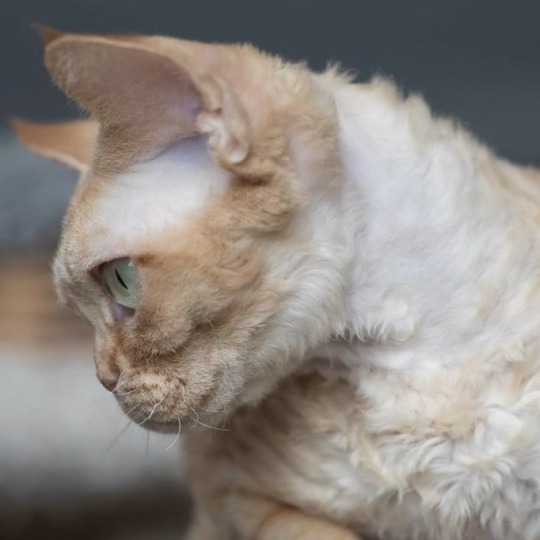
On the left we have a Sphynx and in the right we have a Devon Rex both with an extreme head type contradictory to the breed standard.
So yes, unfortunately the brachycephalic head type is a problem in cats. Some try to argue that brachycephalic animals often live long lives which means the abnormal structure isn’t a problem… but longevity is only one measure of a breeds ethical soundness, quality of life and history are also important in my opinon.
2K notes
·
View notes
Text
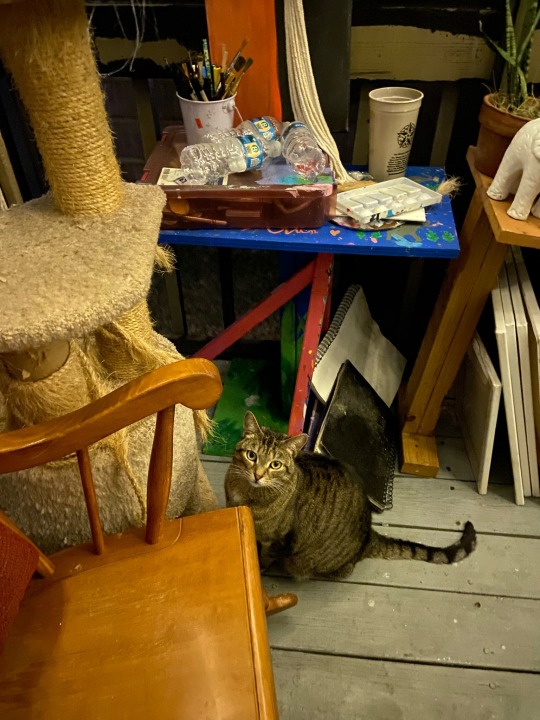
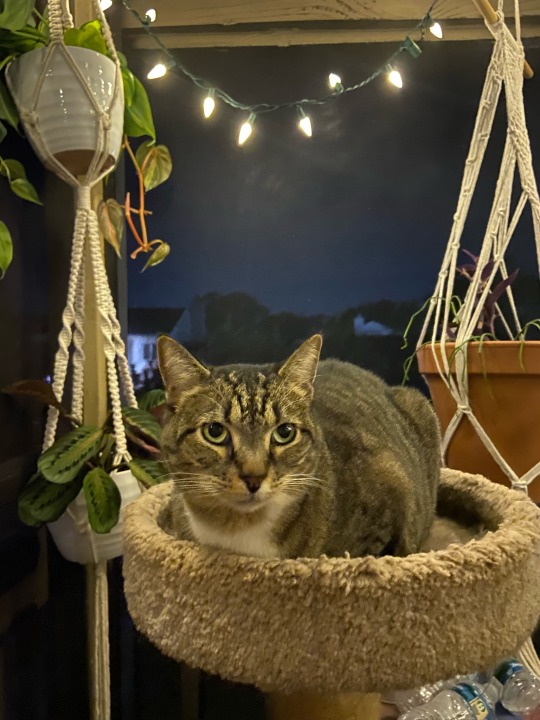
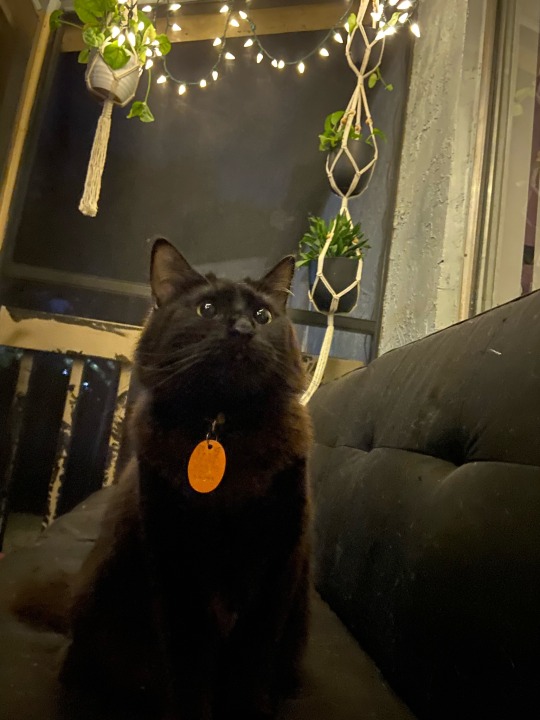
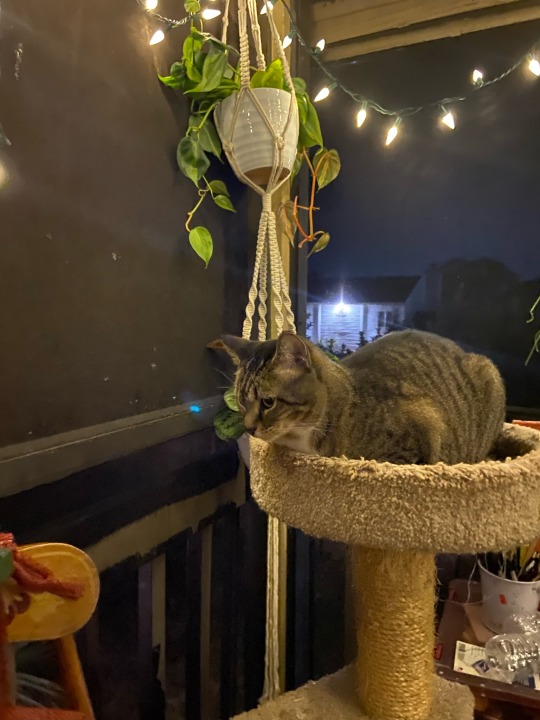

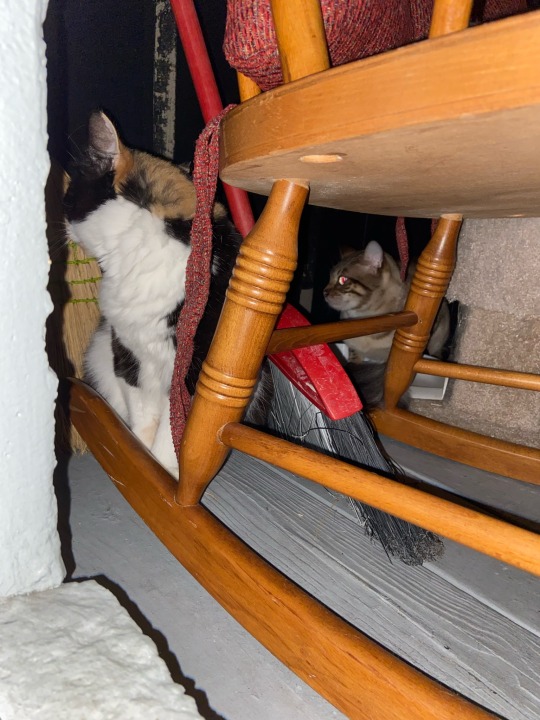
My babies love it out here … I do too 🥰
#adorable#animals#pets#animal lover#vet tech#vet nurse#artist#cats#exotic pets#cat mom#cat#veterinary medicine#vet school#future vet#vet tech life#vet med life#vet med#vet nurse life#happy#lights#Christmas#Christmas lights#Halloween#holiday lights#decoration#decor#outdoor decor#plants#plant mom#plants plants plants
1 note
·
View note
Text
Animal Farm
Male Yandere Farm Harem x Gender Neutral Reader
(CW: Noncon, brief mention of cockwarming, brief mention of scenting, cum milking, yandere farm hybrids, detained reader, breeding kink, harpies, bull men, centaurs, dog men, cat men)
Word Count: 860
(Was chatting with a friend about how I had a farmer/gardener hat and how I just need overalls, a white bandana, and a pink shirt and I will look like a professional trans monsterfucking rancher, this short fic is the result of that discussion, I hope it will eventually serve as a source of asks in the future. I know it is brief, but I loved writing this.)
(Animal Farm: Mondays, the mini-fic involving the harpies, can be found HERE.)
(Animal Farm: Tuesdays, the mini-fic involving the dog-men, can be found HERE.)
(Animal Farm: Wednesdays, the mini-fic involving the centaurs, can be found HERE.)
When you had first taken the leap to add monster ranching to your farm you were unsure if it would be a profitable venture, there were not many such places where you lived, but you did not know if demand would be high for unorthodox products such as monster semen.
You started off with just one centaur, he produced huge quantities of cum from milking him twice a day, and it sold so well that you were soon able to add yet another centaur.
Two was plenty to keep fulfilling the centaur semen needs of your small community so once you had enough funds you invested in three harpy men that laid a ton of eggs, despite being males, and they also produced some extra ball batter for you to peddle as well.
Now you were making money from your usual crops, harpy cum and eggs, which were highly prized, and centaur cum. In almost no time at all you were ready to add yet more monster men to your growing ranch.
Three large bull men now called your little slice of paradise home, their jizz was similar to the centaurs, but the flavor was quite a bit different and used differently in recipes. It also had a slightly different use in folk medicine as well.
Milking and feeding all the monster men on your ranch was hard work but very profitable, but soon you noticed that eggs were being stolen and you eventually caught the culprits drinking from your centaurs early one morning.
Two cat men desperate for food. You adopted them and used them for pest control around the crops and provided them with food and shelter in their own stable. You also added their cum to your product list.
To make sure you did not have any more thieves though, and possibly more dangerous intruders, you got three dog men who patrolled your property in shifts, all they needed to keep them happy were some holes to breed and you, and the cat boys who were constantly in heat, were happy to provide them with a place to dump their seed.
Now you had cat, dog, bird, bull, and horse hybrids on your property as well as many exotic crops which you had learned responded really well to having monster cum mixed into the compost. Your business was BOOMING, it was perfect. The monster men all got along with one another for the most part, and they were all extra sweet to you, the brawny bull hybrids even helped you plant and harvest your fruits and vegetables.
It was a great life, for a while.
But you grew so many things and sold so much monster cum that you were gone off at the market far too often for your monster’s taste. They convened and decided that the proper place for you was with them, at the farm where you had an entire harem of mighty beast men to look out for you.
After they decide this they confront you when you get back from the market. You try to reason with them but they are all very adamant, you will be their little mate that they kept close and safe and that was simply all there was to it. They could milk themselves and the centaurs and bull men could easily haul the cart to market and one of the cat men could deal with customers because they were so sweet and charismatic.
There was only one problem, who would get to spend time with you?
They made up a strict schedule to avoid any fighting. On Mondays you would spend your time with the harpy men, who greatly enjoyed tweeting and singing to you when they were not busy breeding with you.
On Tuesdays you were property of the dog men, who always left you smelly and covered in their musk and cum.
Wednesdays meant you belonged to the centaurs, they liked to run around with you riding them while wrapping your little human arms around their muscular torsos, and they also adored using you as a cock sleeve, bulging your tummy out as they bred you.
Thursdays you belonged to the felines. They were normally bottoms for the dog men, but they still greatly enjoyed using you as a cumdump. When they finished mating with their beloved human they became the cuddliest of all the hybrids, purring and nuzzling and sleeping all snuggled up with you.
Fridays you were with the three bull men, which meant that you spent damn near the entire day being used as a cock warmer that was swapped between three equally well hung dicks. When they weren't having you sit on them, and oftentimes while they were, they were grooming and licking you, feeding you, and in general babying their sweet owner.
Saturdays and Sundays you were allowed to rest, and you needed it. But you never had anywhere near enough energy to even attempt an escape, and even if you did the dogs would just sniff you out. So you had had to accept your imprisonment at the hands of the monster men you supposedly owned.
#yandere teratophilia#yandere terato#yandere monster men#yandere farm#yandere harpies#yandere bull men#yandere centaurs#yandere cat men#yandere dog men#yandere harpy#yandere bull man#yandere centaur#yandere cat man#yandere dog man#farm harem#monster farm harem#yandere monster farm harem
7K notes
·
View notes
Text
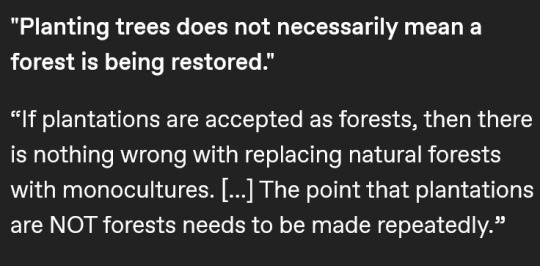
Despite its green image, Ireland has surprisingly little forest. [...] [M]ore than 80% of the island of Ireland was [once] covered in trees. [...] [O]f that 11% of the Republic of Ireland that is [now] forested, the vast majority (9% of the country) is planted with [non-native] spruces like the Sitka spruce [in commercial plantations], a fast growing conifer originally from Alaska which can be harvested after just 15 years. Just 2% of Ireland is covered with native broadleaf trees.
Text by: Martha O’Hagan Luff. “Ireland has lost almost all of its native forests - here’s how to bring them back.” The Conversation. 24 February 2023. [Emphasis added.]
---
[I]ndustrial [...] oil palm plantations [...] have proliferated in tropical regions in many parts of the world, often built at the expense of mangrove and humid forest lands, with the aim to transform them from 'worthless swamp' to agro-industrial complexes [...]. Another clear case [...] comes from the southernmost area in the Colombian Pacific [...]. Here, since the early 1980s, the forest has been destroyed and communities displaced to give way to oil palm plantations. Inexistent in the 1970s, by the mid-1990s they had expanded to over 30,000 hectares. The monotony of the plantation - row after row of palm as far as you can see, a green desert of sorts - replaced the diverse, heterogenous and entangled world of forest and communities.
Text by: Arturo Escobar. "Thinking-Feeling with the Earth: Territorial Struggles and the Ontological Dimension of the Epistemologies of the South." Revista de Antropologia Iberoamericana Volume 11 Issue 1. 2016. [Emphasis added.]
---
But efforts to increase global tree cover to limit climate change have skewed towards erecting plantations of fast-growing trees [...] [because] planting trees can demonstrate results a lot quicker than natural forest restoration. [...] [But] ill-advised tree planting can unleash invasive species [...]. [In India] [t]o maximize how much timber these forests yielded, British foresters planted pines from Europe and North America in extensive plantations in the Himalayan region [...] and introduced acacia trees from Australia [...]. One of these species, wattle (Acacia mearnsii) [...] was planted in [...] the Western Ghats. This area is what scientists all a biodiversity hotspot – a globally rare ecosystem replete with species. Wattle has since become invasive and taken over much of the region’s mountainous grasslands. Similarly, pine has spread over much of the Himalayas and displaced native oak trees while teak has replaced sal, a native hardwood, in central India. Both oak and sal are valued for [...] fertiliser, medicine and oil. Their loss [...] impoverished many [local and Indigenous people]. [...]
India’s national forest policy [...] aims for trees on 33% of the country’s area. Schemes under this policy include plantations consisting of a single species such as eucalyptus or bamboo which grow fast and can increase tree cover quickly, demonstrating success according to this dubious measure. Sometimes these trees are planted in grasslands and other ecosystems where tree cover is naturally low. [...] The success of forest restoration efforts cannot be measured by tree cover alone. The Indian government’s definition of “forest” still encompasses plantations of a single tree species, orchards and even bamboo, which actually belongs to the grass family. This means that biennial forest surveys cannot quantify how much natural forest has been restored, or convey the consequences of displacing native trees with competitive plantation species or identify if these exotic trees have invaded natural grasslands which have then been falsely recorded as restored forests. [...] Planting trees does not necessarily mean a forest is being restored. And reviving ecosystems in which trees are scarce is important too.
Text by: Dhanapal Govindarajulu. "India was a tree planting laboratory for 200 years - here are the results." The Conversation. 10 August 2023. [Emphasis added.]
---
Nations and companies are competing to appropriate the last piece of available “untapped” forest that can provide the most amount of “environmental services.” [...] When British Empire forestry was first established as a disciplinary practice in India, [...] it proscribed private interests and initiated a new system of forest management based on a logic of utilitarian [extraction] [...]. Rather than the actual survival of plants or animals, the goal of this forestry was focused on preventing the exhaustion of resource extraction. [...]
Text by: Daniel Fernandez and Alon Schwabe. "The Offsetted." e-flux Architecture (Positions). November 2013. [Emphasis added.]
---
At first glance, the statistics tell a hopeful story: Chile’s forests are expanding. […] On the ground, however, a different scene plays out: monocultures have replaced diverse natural forests [...]. At the crux of these [...] narratives is the definition of a single word: “forest.” [...] Pinochet’s wave of [...] [laws] included Forest Ordinance 701, passed in 1974, which subsidized the expansion of tree plantations [...] and gave the National Forestry Corporation control of Mapuche lands. This law set in motion an enormous expansion in fiber-farms, which are vast expanses of monoculture plantations Pinus radiata and Eucalyptus species grown for paper manufacturing and timber. [T]hese new plantations replaced native forests […]. According to a recent study in Landscape and Urban Planning, timber plantations expanded by a factor of ten from 1975 to 2007, and now occupy 43 percent of the South-central Chilean landscape. [...] While the confusion surrounding the definition of “forest” may appear to be an issue of semantics, Dr. Francis Putz [...] warns otherwise in a recent review published in Biotropica. […] Monoculture plantations are optimized for a single product, whereas native forests offer [...] water regulation, hosting biodiversity, and building soil fertility. [...][A]ccording to Putz, the distinction between plantations and native forests needs to be made clear. “[...] [A]nd the point that plantations are NOT forests needs to be made repeatedly [...]."
Text by: Julian Moll-Rocek. “When forests aren’t really forests: the high cost of Chile’s tree plantations.” Mongabay. 18 August 2014. [Emphasis added.]
2K notes
·
View notes
Text

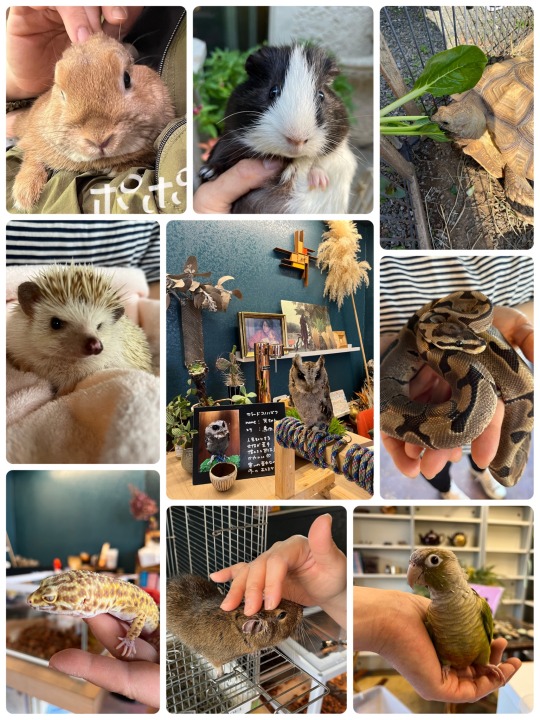
Hi this is small animal room in Ota Japan.there’re a lot of small cute animals here that you can touch,feel them,also just being with them in small quiet room surrounded by nature mountain area.Be relaxed with gentle little friends.also there’s a vet here so you can ask husbandry and diseases of you exotic pets. We look forward to seeing you here!!
0 notes
Text
in addition to being prone to an obvious naturalistic fallacy, the oft-repeated claim that various supplements / herbs / botanicals are being somehow suppressed by pharmaceutical interests seeking to protect their own profits ('they would rather sell you a pill') belies a clear misunderstanding of the relationship between 'industrial' pharmacology and plant matter. bioprospecting, the search for plants and molecular components of plants that can be developed into commercial products, has been one of the economic motivations and rationalisations for european colonialism and imperialism since the so-called 'age of exploration'. state-funded bioprospectors specifically sought 'exotic' plants that could be imported to europe and sold as food or materia medica—often both, as in the cases of coffee or chocolate—or, even better, cultivated in 'economic' botanical gardens attached to universities, medical schools, or royal palaces and scientific institutions.
this fundamental attitude toward the knowledge systems and medical practices of colonised people—the position, characterising eg much 'ethnobotany', that such knowledge is a resource for imperialist powers and pharmaceutical manufacturers to mine and profit from—is not some kind of bygone historical relic. for example, since the 1880s companies including pfizer, bristol-myers squibb, and unilever have sought to create pharmaceuticals from african medicinal plants, such as strophanthus, cryptolepis, and grains of paradise. in india, state-created databases of valuable 'traditional' medicines have appeared partly in response to a revival of bioprospecting since the 1980s, in an increasingly bureaucratised form characterised by profit-sharing agreements between scientists and local communities that has nonetheless been referred to as "biocapitalism". a 1990 paper published in the proceedings of the novartis foundation symposium (then the ciba foundation symposium) spelled out this form of epistemic colonialism quite bluntly:
Ethnobotany, ethnomedicine, folk medicine and traditional medicine can provide information that is useful as a 'pre-screen' to select plants for experimental pharmacological studies.
there is no inherent oppositional relationship between pharmaceutical industry and 'natural' or plant-based cures. there are of course plenty of examples of bioprospecting that failed to translate into consumer markets: ginseng, introduced to europe in the 17th century through the mercantile system and the east india company, found only limited success in european pharmacology. and there are cases in which knowledge with potential market value has actually been suppressed for other reasons: the peacock flower, used as an abortifacient in the west indies, was 'discovered' by colonial bioprospectors in the 18th century; the plant itself moved easily to europe, but knowledge of its use in reproductive medicine became the subject of a "culturally cultivated ignorance," resulting from a combination of funding priorities, national policies, colonial trade patterns, gender politics, and the functioning of scientific institutions. this form of knowledge suppression was never the result of a conflict wherein bioprospectors or pharmacists viewed the peacock flower as a threat to their own profits; on the contrary, they essentially sacrificed potential financial benefits as a result of the political and social factors that made abortifacient knowledge 'unknowable' in certain state and commercial contexts.
exploitation of plant matter in pharmacology is not a frictionless or infallible process. but the sort of conspiratorial thinking that attempts to position plant therapeutics and 'big pharma' as oppositional or competitive forces is an ahistorical and opportunistic example of appealing to nominally anti-capitalist rhetoric without any deeper understanding of the actual mechanisms of capitalism and colonialism at play. this is of course true whether or not the person making such claims has any personal financial stake in them, though it is of course also true that, often, they do hold such stakes.
537 notes
·
View notes